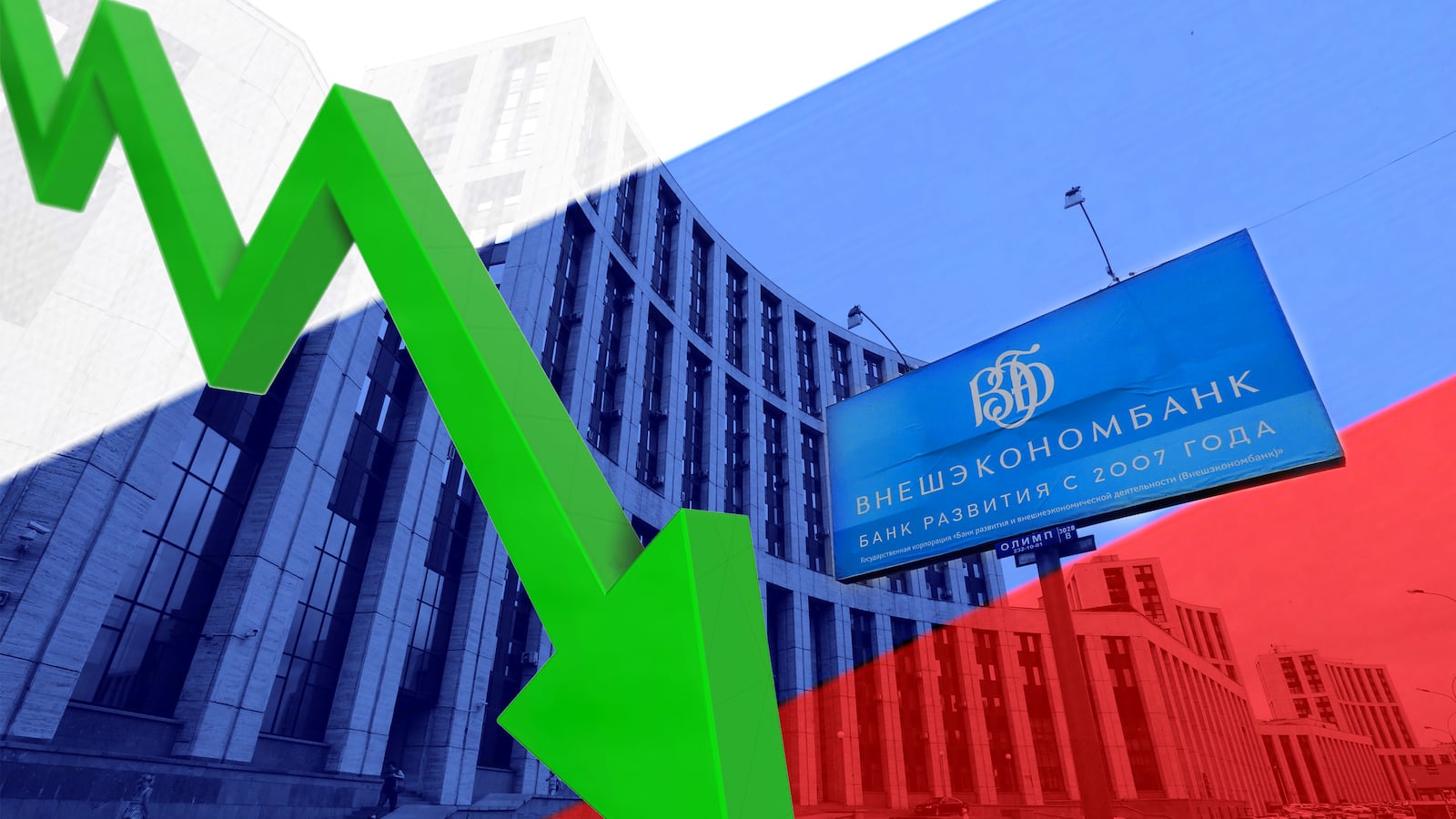A $10 billion Russian investment fund retained a Manhattan-based public-relations firm to help burnish its image in the face of escalating U.S. sanctions over Russia’s bellicose actions in Ukraine, according to a Foreign Agents Registration Act filing with the Department of Justice.
Goldin Solutions, which specializes in reputation management, is headed by former MSNBC editorial director Davidson Goldin, who also worked previously as a co-host of New York cable station NY1’s nightly political TV show, Inside City Hall. The Russian Direct Investment Fund agreed to pay Goldin Solutions $30,000 a month for its PR assistance, according to the DoJ filing.
“The contract [with the RDIF] speaks for itself,” Goldin said, when contacted about the deal. He declined to discuss why the RDIF chose his firm or to elaborate on the specific media services provided to the fund.
The RDIF is working to stave off potential U.S. sanctions now imposed on other Russian financial-sector players stemming from Russia’s military incursions into neighboring Ukraine—including its annexation this past spring of Crimea. Though not a traditional lender, some of the RDIF’s investments, by bolstering the Russian economy—including investments in factories—can be seen as indirectly assisting the country’s military machine.
The RDIF, created in 2011, is a state-controlled fund set up to make targeted investments in Russia in partnership with foreign investors. The fund’s management company is a subsidiary of the Russian state development bank Vnesheconombank, or VEB, which is a target of U.S. sanctions.
The U.S. sanctions now imposed against six major Russian banks are crafted to make it very difficult for them to raise capital in international markets. RDIF officials argue that the fund is not in the same class as a bank because it makes investments in targeted Russian companies in partnership with foreign partners, including U.S. companies.
“RDIF does not directly attract equity or debt financing but instead invests only its own funds together with co-investors,” RDIF said in a prepared statement posted on its website. “We have never attracted such direct financing and are not planning to do it in the future. Accordingly the sanctions do not affect RDIF investment activity in any way.”
So far, the RDIF has avoided U.S. sanctions—even though its management company is an arm of a Russian bank, VEB, now on the sanctions list. It also counts among its “supervisory board” members, according to its website, Russian President Vladimir Putin’s chief of staff, Sergei Ivanov—who also is a target of U.S. sanctions.
Despite Goldin’s reluctance to talk about his firm’s relationship with the RDIF, it would seem one of Goldin Solutions’ jobs has been to engage in some reputation management by putting distance between RDIF’s operations and its parent bank and board member, which are facing U.S. sanctions.
“We… are pleased to confirm that… RDIF retains Goldin Solutions Inc. for media engagement and related strategic efforts,” Goldin’s contract with the RDIF management company states, according to the DoJ filing. The filing also indicates that Goldin Solutions was hired by the Russian investment fund to provide “communications/public-relations outreach primarily to U.S. media.” The pact covered two months, September and October, but “may be extended by the parties,” the filing states.
Goldin Solutions’ website lists among its current or former clients a number of media companies, including Fortune, BBC America, Time, radio-station operator Cumulus, and AMC Networks. The firm’s LinkedIn page indicates that it “is a full-service communications firm that specializes in providing media relations, strategic counsel, and reputation management to leading corporations, foundations and CEOs worldwide.”
According to media reports and Davidson Goldin’s personal LinkedIn account, Goldin has worked in the past as an associate producer at NBC News and at Fox News, as an anchor and political reporter for NY1 News, as the editorial director at MSNBC from July 2006 to December 2007, and the co-founder in 2008 of another New York City-based reputation-management firm, DolceGoldin. He launched Goldin Solutions in April 2010.
The RDIF’s international board, as its website lists, includes some high-powered U.S.-based private-equity players, including Leon Black of Apollo Global Management, David Bonderman of TPG Capital, and Stephen Schwarzman of the Blackstone Group.
The Russian fund also inked a consulting deal last year with Goldman Sachs to help improve its standing among foreign investors, according to reports in the Russian press and Bloomberg News. The RDIF’s CEO, Kirill Dmitriev, is a former Goldman Sachs investment banker who earned an MBA from the Harvard Business School.
The RDIF describes itself as “a $10 billion fund established by the Russian government to make equity investments primarily in the Russian economy.” The fund and its “co-investors”—which include Asian, Middle Eastern, European, and U.S. companies—to date have made some $7 billion in direct investments in the Russian economy. It states that bulk of that money has come from the fund’s international partners.
Among the U.S. co-investors who have participated in deals put together by the RDIF are General Electric, which joint ventured with the fund “to cooperate in the construction of autonomous mini power plants built specifically for manufacturing facilities across Russia,” according to a 2013 press release issued by the RDIF.
Another U.S.-based co-investment team includes Illinois-based tire maker and distributor Titan International Inc. and JPMorgan Chase’s private investment arm One Equity Partners. The two U.S. entities, along with the RDIF, last year acquired a majority interest in a leading Russian tire maker, Voltyre-Prom.
Titan and GE officials did not respond to requests for comment.
All those connections to U.S. corporate interests appear to give the RDIF an ample store of “image-management” ammunition to fight back against any move by the White House and Treasury to impose sanctions against it. Working against that cause, though, is any perception that the Russian factories being supported through RDIF investment deals are helping to prop up the Russian military’s bellicose exploits in the Ukraine.
And Goldin Solutions is not the lone U.S. firm retained by the RDIF. The Russian fund also brought on board the Washington, D.C.-based lobbying firm Capitol Counsel LLC on a monthly retainer of $45,000 for “a minimum period of two months,” a Justice Department filing shows. Capitol Counsel’s charge, the same filing indicates, is to provide “accurate information to the U.S. Department of Treasury regarding recent transactions made by RDIF.”
In addition to lobbying Treasury, it also appears Capitol Counsel’s objectives are colored with a media-management mission.
“Recent press articles have significantly misstated the role and function of RDIF,” state documents included with Capitol Counsel’s Foreign Agents Registration Act filing. “To help address this concern, Capitol Counsel proposes to assist the RDIF in correcting the press reports by working with the U.S. investors and the international investment community to educate the [Obama] administration and major policy makers as to the role of RDIF and its relationship with U.S. business and investors.”
Capitol Counsel officials did not respond to a request for comment.
A spokesperson for the Treasury Department’s Office of Foreign Assets Control also declined to comment on whether the RDIF might be a target for future U.S. sanctions.
UPDATE: "My firm has done nothing to shield anyone or any entity from any sanctions," Goldin told The Daily Beast in an email.






